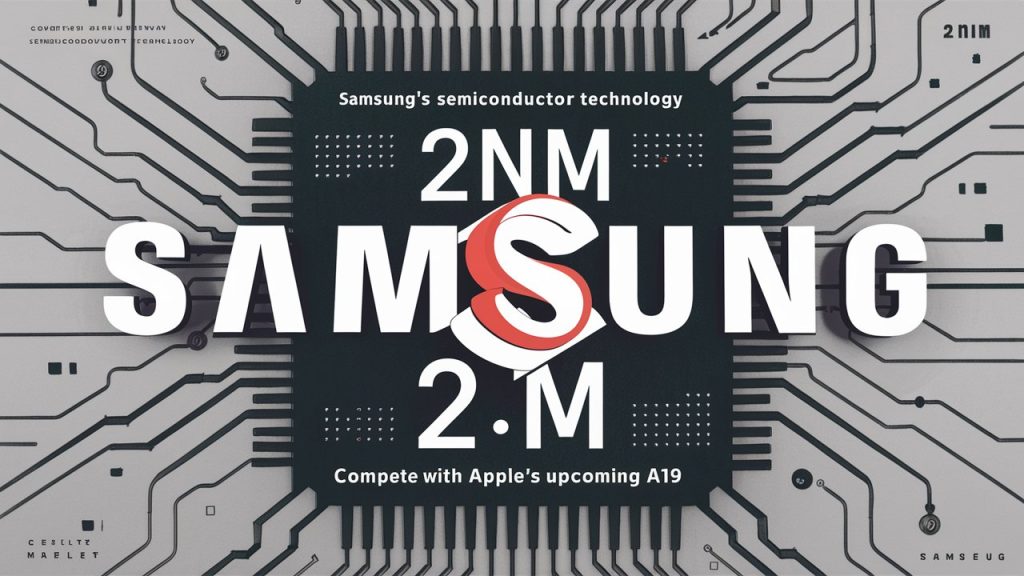In the ever-evolving world of semiconductor technology, the competition between tech giants Samsung and Apple has reached new heights. Samsung is reportedly working on a groundbreaking 2nm chip, aiming to outpace Apple’s highly anticipated A19 processor.
This development marks a significant leap in the race for semiconductor supremacy, with both companies pushing the boundaries of innovation and performance.
The Significance of 2nm Technology
The move towards 2nm technology represents a monumental shift in the semiconductor industry. This next-generation process node promises substantial improvements in performance, power efficiency, and overall chip density.
As transistors shrink in size, they can be packed more densely, allowing for more powerful and energy-efficient processors. For consumers, this means faster, more responsive devices with longer battery life.
Is a 2nm Chip Possible?
The question of whether a 2nm chip is possible has intrigued many in the tech community. The answer lies in the advancements in semiconductor manufacturing techniques.
As we approach the physical limits of Moore’s Law, companies like Samsung are pioneering new methods to push the boundaries of what’s achievable. Extreme ultraviolet (EUV) lithography and other cutting-edge technologies are critical in making 2nm chips a reality.
What is a 2nm Chip?
A 2nm chip refers to a semiconductor device with transistors that measure just 2 nanometers in length. To put this in perspective, a nanometer is one-billionth of a meter.
This incredibly small scale allows for a greater number of transistors to be packed into a single chip, enhancing its computational power and efficiency. The 2nm designation is more about the scale of the technology used than the actual physical size of the transistors.
What Does a 2nm Chip Mean?
A 2nm chip signifies a major leap forward in semiconductor technology. It means more powerful processors, reduced energy consumption, and greater overall efficiency. For the end user, this translates to faster smartphones, more capable AI, longer battery life, and enhanced performance in various applications from gaming to data processing.
Samsung’s Ambitious Plans
Samsung’s push for a 2nm chip demonstrates its commitment to maintaining a competitive edge in the semiconductor market.
The company’s research and development efforts have been focused on overcoming the challenges associated with such a minute process node. Samsung’s goal is to not only match but surpass the performance metrics of Apple’s upcoming A19 chip.
Key Features and Innovations
- Enhanced Performance: Samsung’s 2nm chip is expected to deliver a significant boost in processing power, making it ideal for demanding applications such as artificial intelligence, gaming, and augmented reality.
- Improved Power Efficiency: One of the primary advantages of the 2nm process is its ability to reduce power consumption. This translates to longer battery life for mobile devices and reduced energy costs for data centers.
- Advanced Manufacturing Techniques: Samsung is leveraging cutting-edge manufacturing technologies, including extreme ultraviolet (EUV) lithography, to achieve the high precision required for 2nm transistors.
- Integration of AI and Machine Learning: The new chip will likely feature enhanced capabilities for AI and machine learning, providing a competitive edge in emerging tech markets.
Competing with Apple’s A19
Apple’s A19 chip is rumored to be a formidable contender, with significant advancements in processing power and efficiency. The competition between Samsung and Apple has always driven innovation, and this new phase is no different. Both companies are investing heavily in research and development to ensure their chips set new benchmarks in the industry.
Personal Insights and Expectations
As a tech enthusiast, I am particularly excited about the potential of Samsung’s 2nm chip. Having experienced the rapid evolution of processors over the years, it’s fascinating to see how each new generation brings transformative changes to our devices. The transition from 5nm to 3nm was impressive, but the jump to 2nm represents an even more significant leap.
From personal experience, the impact of more efficient chips is profound. Whether it’s extending the battery life of my smartphone or enhancing the performance of my laptop, these advancements directly influence my daily workflow. I anticipate that Samsung’s 2nm chip will continue this trend, offering unprecedented levels of performance and efficiency.
Conclusion
The competition between Samsung and Apple in the semiconductor industry is reaching new heights with the development of Samsung’s 2nm chip and Apple’s A19 processor. This rivalry is driving innovation, resulting in more powerful and efficient devices for consumers. As we look forward to the launch of these next-generation chips, it’s clear that the future of technology is brighter than ever.
In summary, Samsung’s 2nm chip represents a significant advancement in semiconductor technology, promising enhanced performance, improved power efficiency, and cutting-edge features. As these developments unfold, tech enthusiasts and consumers alike can expect a new era of innovation and competition in the world of processors.






